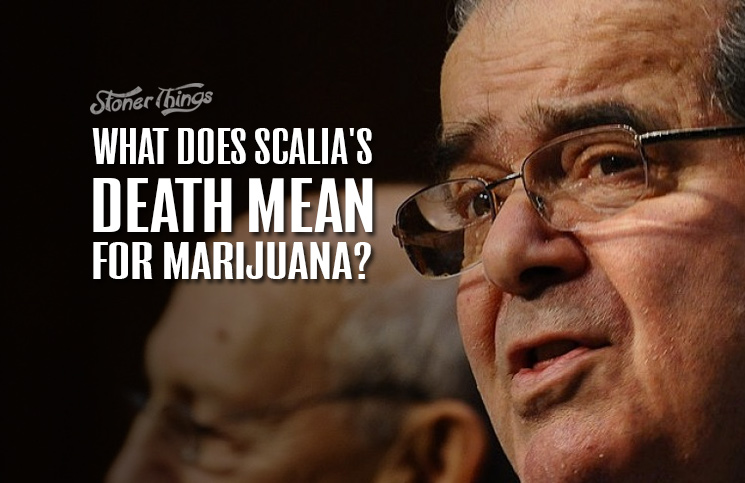The unexpected death of a sitting U.S. Supreme Court justice – during a pivotal election year, no less – brings many things immediately to mind, but marijuana isn’t one of them.
 Most cannabis law, after all, comes from public referendums, state legislatures, Congress, and the president, not the high court. Though the justices have decided their share of cases involving the drug, it’s hard to see them legalizing it from coast to coast.
Most cannabis law, after all, comes from public referendums, state legislatures, Congress, and the president, not the high court. Though the justices have decided their share of cases involving the drug, it’s hard to see them legalizing it from coast to coast.
But that perspective is misleading. The sudden death of Justice Antonin Scalia in February could have a massive impact on the future of cannabis in America.
Scalia took a back seat on marijuana cases
Scalia, 79, was himself involved in relatively few marijuana cases before the court. He wrote the majority opinion in Gonzales v. Raich, a case involving cultivation in California, but otherwise took a back seat.
The Gonzales case reached the justices in 2005. It pitted California and its medical marijuana program against the DEA and other federal agencies. The court ruled that federal agents have the power to arrest growers in California even if they follow state cannabis laws.
The decision had an immediate impact on MMJ in the Golden State. Aggressive U.S. attorneys and the DEA made a point of targeting legal cannabis dispensaries in large swaths of the state. That campaign has tapered off in recent months, but the case set a dangerous precedent.
Still, it didn’t decide whether states are free to legalize – only that federal authorities can punish tokers in those states. The real impact of Scalia’s life on marijuana may come not from his life but from his death.
Nebraska, Oklahoma seeking to stop legalization in Colorado
At least one major marijuana case could reach the court before Scalia’s replacement is nominated by the president and approved by the Senate – a case that threatens to stop legalization in its tracks.
The lawsuit, brought by the Republican governors of Nebraska and Oklahoma, seeks to stop Colorado from permitting a legal cannabis industry on the grounds that large amounts of pot are being smuggled into their states. Public statistics say otherwise.
The court was considering taking the case when Scalia died, and his vacancy will likely tilt the court to the left for the foreseeable future. Republican senators have promised not to consider any nominee until after the November election, meaning the seat may not be filled until well into 2017.
Tie votes benefit liberal interests


First the court will have to decide whether or not to hear the case. The justices were scheduled to discuss it in conference in February.
The future of the court has major implications for marijuana beyond the lawsuit against Colorado. The court could one day strike down arcane drug laws across the country, end prohibition, and free thousands of non-violent cannabis offenders.
The November election will determine the political leanings of the court, and its approach to cannabis, for at least a generation. A campaign season that started as an angry political grudge match has exploded into a once-in-a-lifetime battle royale over all three branches of government.
And that means your vote could help decide whether you someday walk into a pot shop and buy legal marijuana over the counter, out in the open, on the up and up. Keep that in mind.















